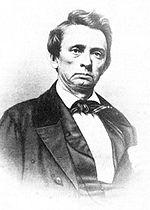William G. Brownlow
| William Gannaway Brownlow | |
|---|---|
 |
|
| 17th Governor of Tennessee | |
|
In office April 5, 1865 – February 25, 1869 |
|
| Preceded by |
Andrew Johnson as Military Governor |
| Succeeded by | Dewitt Clinton Senter |
|
United States Senator from Tennessee |
|
|
In office March 4, 1869 – March 3, 1875 |
|
| Preceded by | David T. Patterson |
| Succeeded by | Andrew Johnson |
| Personal details | |
| Born |
August 29, 1805 Wythe County, Virginia |
| Died | April 29, 1877 (aged 71) Knoxville, Tennessee |
| Resting place |
Old Gray Cemetery Knoxville, Tennessee |
| Political party | Whig, American, Republican |
| Spouse(s) | Eliza O'Brien (1836) |
| Relations | Walter P. Brownlow (nephew) |
| Children | Susan, John Bell, James, Mary, Fannie, Annie, Caledonia Temple |
| Profession | Minister, newspaper editor |
| Religion | Methodist |
| Signature | |
William Gannaway "Parson" Brownlow (August 29, 1805 – April 29, 1877) was an American newspaper editor, minister, and politician. He served as Governor of Tennessee from 1865 to 1869 and as a United States Senator from Tennessee from 1869 to 1875. Brownlow rose to prominence in the 1840s as editor of the Whig, a polemical newspaper in East Tennessee that promoted Whig Party ideals and opposed secession in the years leading up to the American Civil War. Brownlow's uncompromising and radical viewpoints made him one of the most divisive figures in Tennessee political history and one of the most controversial Reconstruction Era politicians of the United States.
Beginning his career as a Methodist circuit rider in the 1820s, Brownlow was both censured and praised by his superiors for his vicious verbal debates with rival missionaries of other sectarian Christian beliefs. And later as a newspaper publisher and editor, he was notorious for his relentless personal attacks against his religious and political opponents, sometimes to the point of being physically assaulted. At the same time, Brownlow was successfully building a large base of fiercely loyal subscribers.
Brownlow returned to Tennessee in 1863 and in 1865 became the war governor with the U.S. Army behind him. He joined the Radical Republicans and spent much of his term opposing the policies of his longtime political foe Andrew Johnson. His gubernatorial policies, which were both autocratic and progressive, helped Tennessee become the first former Confederate state to be readmitted to the Union in 1866. Brownlow's policy of disenfranchising both ex-Confederate leaders and soldiers while utilizing state government to enfranchise African-American former slaves with the right to vote in Tennessee elections fueled the rise of the Ku Klux Klan in the late 1860s.
...
Wikipedia
